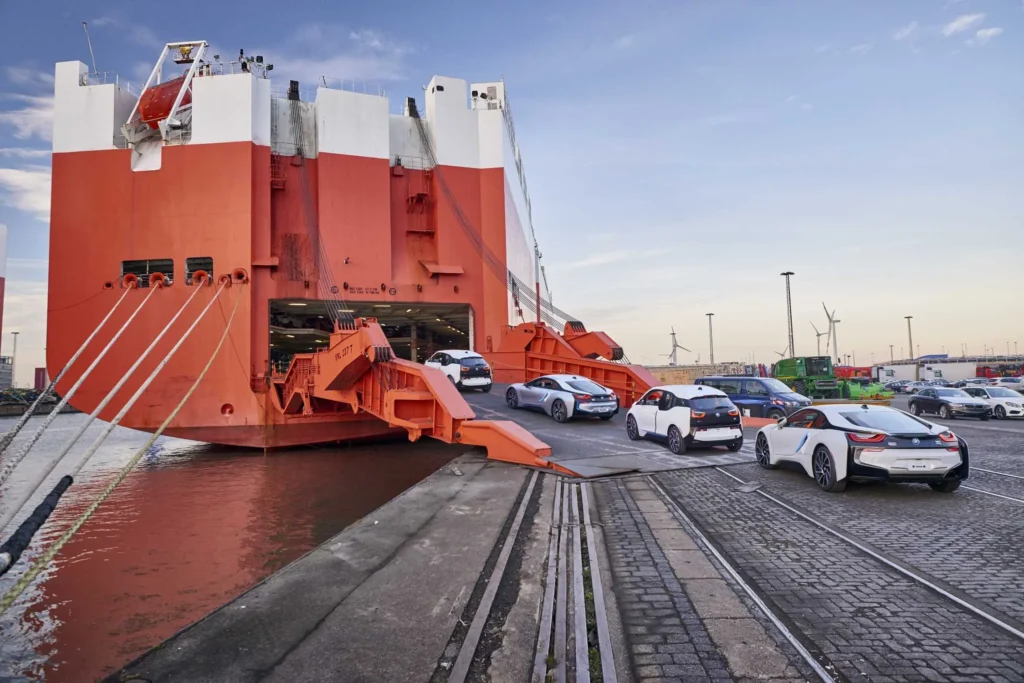Importing cars from Japan to the UK might seem difficult at first. With all of the necessary information and a clear understanding of what to do next, you will realise that it is not as complex as it appears. Japanese automobiles are well-known for their dependability, added utility, and Migrant-Binding quality, making them a popular choice among UK car lovers. This tutorial will explain all you need to know about importing a car from Japan to the UK.
Table of Contents
Why Import a Car from Japan?
Well why do so many people import cars from Japan to the UK in this case then?! So here are the main reasons :

- Wide Selection: Japan has a huge selection of cars, including many models that are either hard to find or more expensive in the UK. You can also find cars in excellent condition with low mileage.
- High Standards: Japanese vehicles tend to be well-maintained, as they have strict car inspection standards in the country. This means you’re more likely to get a high-quality car.
- Unique Models: Some Japanese cars, especially certain sports cars or classics, are not available in Europe. This makes them highly desirable for collectors and enthusiasts.
- Good Value for Money: Often, buying a car in Japan and importing it can be more cost-effective, even with the added fees, than buying a similar model in the UK.
Step 1: Choose the Right Car
Choose the vehicle.The first step in importing a car to Japan, like with any other nation, is to decide which vehicle you want. Then you’ll select the automobile (make and model) that interests you the most, and then look at what’s for sale in Japan.
- Where to Look: There are numerous online Japanese car auction sites and dealers that specialize in exporting cars to the UK. Some popular options include:
- Japanese used car auction websites
- Dealerships that sell Japanese cars for export
- Specialist import companies
- Auction Sites: Japanese car auctions are where you’ll find the biggest selection of cars. Some of the most reputable auction houses include USS, AucNet, and JU. Many companies offer auction services where you can browse listings, place bids, and have the car shipped directly to the UK.
- Consider the Condition: When purchasing from Japan, you’ll see a grading system for the car’s condition. Here’s what to look for:
- Grade 5 or 6: Almost new, excellent condition.
- Grade 4: Good condition with some minor wear.
- Grade 3: Average condition, may require some repairs.
Tip: Choose a car with good auction grades and low mileage for the best results.
Step 2: Check UK Import Regulations
Not every car can be imported into the UK, so it’s essential to check that the vehicle you want to bring in meets the necessary criteria.
- Age of the Car: If the car is under 10 years old, it will need to pass the Individual Vehicle Approval (IVA) test to ensure it meets UK safety and environmental standards. Cars over 10 years old only need to pass the MOT test, as they are considered “classic cars.”
- Environmental Standards: The UK has strict emissions standards, so you’ll need to make sure your car complies with them. If the vehicle was produced before certain emission standards, it might not be allowed on the road or could require modifications.
- Right-Hand Drive: Japan drives on the left-hand side of the road, just like the UK, so most cars are right-hand drive, making them ideal for UK roads. However, always double-check to ensure this is the case for the specific model you’re interested in.
Step 3: Calculate the Total Cost
While Japanese cars can be cheaper to buy, it’s important to consider all the additional costs that come with importing. Here are the key expenses:

- Purchase Price: This is the cost of the car at auction or from a dealer.
- Shipping Costs: Shipping a car from Japan typically costs between £800 to £1,500, depending on the size of the car and the shipping method (roll-on/roll-off or container shipping).
- Import Duties and Taxes:
- Import Duty: You’ll need to pay a 10% import duty based on the car’s value.
- VAT: Value-added tax (VAT) is 20% of the total cost (including the car’s price, shipping, and import duty).
- Testing and Registration: Once the car arrives in the UK, you’ll need to get it tested (MOT or IVA) and registered with the DVLA. This can cost around £300–£600.
- Insurance: Insurance for imported vehicles may be higher than standard cars, so make sure to factor this in.
Tip: Keep a detailed budget and account for every step to avoid any unexpected expenses.
Step 4: Hire a Shipping Agent or Import Specialist
While it is possible to import a car from Japan by yourself, hiring a shipping agent or an import specialist is highly recommended, especially if it’s your first time.
- What They Do: These companies can handle everything from purchasing the car, shipping, customs clearance, and ensuring all legalities are met. They can also arrange for the car to pass the necessary tests (MOT or IVA) and register it with the DVLA on your behalf.
- Choosing the Right Agent: Look for a reputable company with experience in importing cars from Japan to the UK. Check reviews and ask for recommendations from others who have successfully imported cars.
Step 5: Shipping and Customs Clearance
Once you’ve purchased the car and hired a shipping agent, the car will be shipped to the UK. There are two common shipping methods:

- Roll-on/Roll-off (RoRo): The car is driven onto the ship and driven off once it arrives in the UK. This is the cheapest option, but your car will be exposed to the elements during transport.
- Container Shipping: The car is placed in a container and shipped. This is more expensive but offers better protection for your vehicle.
Once the car arrives in the UK, it will go through customs. Your shipping agent or specialist will typically handle this part of the process.
Step 6: Testing and Modifications
Before you can legally drive your imported car on UK roads, it will need to pass certain tests and may require modifications.
- IVA or MOT Test: If the car is less than 10 years old, it must pass an Individual Vehicle Approval (IVA) test to ensure it meets UK standards. Older cars need an MOT test.
- Modifications: You may need to modify the car to meet UK requirements. Common changes include:
- Converting the speedometer to show miles per hour (MPH) instead of kilometers.
- Adjusting the headlights to ensure they’re suitable for UK roads.
Step 7: Registering the Car with the DVLA
The car needs to be registered with the Driver and Vehicle Licensing Agency (DVLA) after it passes all the tests and any changes that need to be made are made. This is what you need to send in:
- Completed registration forms
- Proof of purchase and ownership
- Proof of insurance
- MOT or IVA certificate
- Payment for the registration fee
Once your registration is processed, you’ll receive a UK license plate, and your car will be officially road legal!
Step 8: Get Insurance and Enjoy Your Car
Now that your car is registered, the next thing you should do is get insurance. Also, as we already said, insurance can be more expensive for imported cars than for normal UK cars, so don’t pay attention to this.

And with that insurance in place, you can enjoy your one of a kind Japanese import on the open road!
How Much Does it Cost to Register a Car in the UK from Japan?
Registering a car imported from Japan in the UK involves several steps and associated costs. The key costs include:
- Registration Fee: You’ll need to pay a registration fee to the DVLA, which is currently around £55.
- Testing Fees: If your car is under 10 years old, it will need to pass an Individual Vehicle Approval (IVA) test, which can cost between £300 and £600. If the car is over 10 years old, it only requires an MOT test, which usually costs between £30 and £50.
- Number Plates: You’ll also need to buy UK number plates, which can cost around £20-£50.
In total, registering your car after importing it can range from £400 to £700, depending on the age of the car and whether any modifications or tests are required.
Is It Worth It to Import a Car from Japan?
Especially if you’re seeking for unusual or hard-to-find models, importing a car from Japan can well be worth it. Japan has strict rules for inspecting cars, which is one reason why Japanese cars are known for being reliable, high-quality, and well-kept. Importing rare or valuable cars might be a dream come true for aficionados for cars. Furthermore, even after taxes and shipping fees, the overall cost of some Japanese automobiles may be lower than purchasing the identical car locally in the UK.

Having said that, one should take into account all expenses, including import duty, VAT, shipping, testing, and any necessary changes to guarantee the car satisfies UK criteria. Importing a car from Japan may be a profitable and sensible investment if you properly budget and deal with a competent shipping company or import expert.
Conclusion
Bringing a car back from Japan to the United Kingdom is an exciting opportunity since you have the possibility to possess something that is not common in every home. If you did, and followed these processes from selecting the automobile to knowing the expenses of testing and registration, there is no reason why your Japanese import will not be a pleasure to own. Always plan ahead, cost all components of the project as accurately as possible, and hire a consultant to ensure everything runs smoothly.
FAQs
Can I import cars from Japan to the UK?
Yes, you can import cars from Japan to the UK. However, the car must meet certain requirements, including compliance with UK road regulations. It will need to pass an Individual Vehicle Approval (IVA) test and be registered with the Driver and Vehicle Licensing Agency (DVLA).
How much is import tax on a car from Japan to the UK?
Import tax, also known as duty, on a car from Japan is 10% of the vehicle’s customs value. Additionally, you will have to pay 20% VAT on top of the combined value of the car, shipping costs, and import duty.
Is it worth it to import a car from Japan?
Whether it’s worth it depends on various factors, including the model of the car, shipping costs, taxes, and duties. Japanese cars are often known for their reliability and unique models, so it could be worthwhile if you’re looking for a specific make or model that’s hard to find in the UK.
What is the import duty on cars from Japan?
The import duty on cars from Japan is generally 10% of the vehicle’s customs value. This will be calculated based on the price of the car and any associated shipping costs.


 Blog
Blog